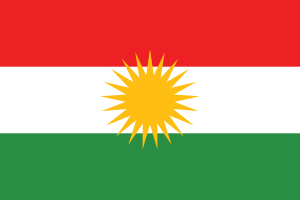Kurds in Japan
Kurds in Japan (Japanese: 在日クルド人 Zainichi Kurudo-jin, Kurdish: Kurdên Japonyayê) refers to Kurds residing in Japan.
| Total population | |
|---|---|
| 2,000[1] | |
| Regions with significant populations | |
| Southern Saitama (Warabi, Kawaguchi) | |
| Languages | |
| Japanese, Kurdish, Turkish, Arabic, Persian | |
| Religion | |
| Islam, Christian |
Legal status
Most Kurds in Japan are from shepherding villages in Southeast Turkey and reside in the Warabi and Kawaguchi areas of Saitama Prefecture, north of Tokyo. Warabi, especially, has been nicknamed "Warabistan"[2][3] by those who are interested in Kurdish people, culture, and issues.
Some Kurdish people arrived in Japan in order to request refugee status; citing human rights abuses in Turkey and Iraq. Nonetheless, so far none have been successful in their application due to Japan's asylum system.[4][5] While many obtain visas through marriage with a Japanese citizen, most have obtained "Special Permission to Stay" (在留特別許可 Zairyū Tokubetsu Kyoka) visas, which must be renewed every three months while their refugee application or appeal is being reviewed. A documentary directed by Masaru Nomoto (野本 大) entitled Backdrop Kurdistan (バックドロップ・クルディスタン) documented the legal struggles of one Kurdish family (Kazankıran family: Japanese: カザンキラン Kazankiran[6]) from Kahramanmaraş Province.
In 2015, a clash took place outside the Turkish embassy in Tokyo between Kurds and Turks in Japan during early voting for the Turkish general election. Japanese and Kurdish sources claimed the clash began when the Turks assaulted the Kurds after a Kurdish party flag was shown at the embassy.[7][8][9]
See also
- Kurdish diaspora
- Turks in Japan
References
- "埼玉で暮らす在日クルド人 「ワラビスタン」のいま - Yahoo!ニュース".
- Chie Matsumoto, "Kurds live lives interrupted" Archived 2011-08-07 at the Wayback Machine, Kurdish Media, original: Asahi Shimbun, April 30
- ワラビスタン~日本のクルド人 (Warabistan - Nihon no Kurudo-jin), Asahi Shimbun, December 15, 2005. (in Japanese)
- "Economist". Retrieved 24 February 2016.
- Tsumura, Tadashi (3 September 2015). "Japan's Kurds often in limbo, despite significant community" – via Japan Times Online.
- Backdrop Kurdistan, goo Eiga. (in Japanese)
- "Turks and Kurds clash in Japan over Turkey elections". www.aljazeera.com.
- "Article expired". The Japan Times. 10 May 2013.
- CGTN (25 October 2015). "Turks clash with Kurds in Tokyo, at least 3 injured" – via YouTube.

